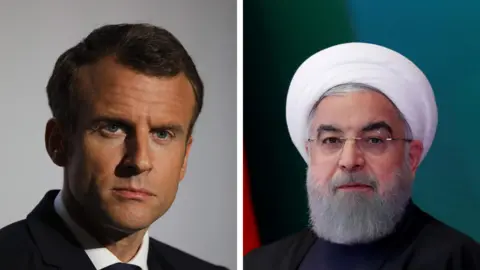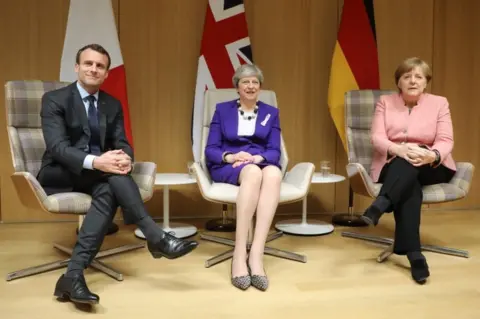Iran nuclear deal: France's Emmanuel Macron pushes for talks
 Reuters and AFP
Reuters and AFPFrench President Emmanuel Macron has spoken to his Iranian counterpart to urge him to enter nuclear talks.
In the phone call, President Hassan Rouhani said the existing seven-nation deal is non-negotiable.
Earlier, France, the UK and Germany agreed that pursuing the current nuclear deal with Iran was the best way to stop it developing nuclear weapons.
But they also said some of the concerns raised by US President Donald Trump must be addressed.
Mr Trump is due to decide in the coming weeks whether to abandon the 2015 deal. The US president has been a strong critic of the international accord, calling it "insane".
In a call lasting more than an hour, President Macron said talks would have to be broadened to cover "three additional, indispensable subjects": the need to discuss what would happens in 2025 when the current deal expires, plus Iran's involvement in Middle Eastern conflicts, and its ballistic missile programme.
These are all issues that have been raised by President Trump, who Mr Macron met in the US last week.
President Rouhani told Mr Macron that Iran "will not accept any restrictions beyond its commitments" to comply with international rules after 2025, according to the Iranian presidency's official website.
He added that even if the US stays in the deal, "it won't be acceptable", as the Trump administration's recent conduct has upset Iran's international standing.
However, Mr Rouhani also said he would work to strengthen relations with France and wanted to co-operate "in all fields".
 AFP
AFPEmmanuel Macron, British Prime Minister Theresa May and German Chancellor Angela Merkel discussed the importance of maintaining the existing deal in separate phone calls with each other over the weekend.
In a statement on Sunday, Downing Street said Mrs May had agreed with her European counterparts that the Iran nuclear deal (Joint Comprehensive Plan of Action) was "the best way of neutralising the threat of a nuclear-armed Iran".
"They agreed that there were important elements that the deal does not cover, but which we need to address - including ballistic missiles, what happens when the deal expires, and Iran's destabilising regional activity," it added.
The new US Secretary of State Mike Pompeo also strongly condemned what he said were Iran's efforts to destabilise the region, on his first visit to Saudi Arabia on Sunday.
"It supports proxy militias and terrorist groups. It is an arms dealer to the Houthi rebels in Yemen. It supports the murderous Assad regime [in Syria] as well," he said in a joint news conference.
Both Mr Macron and Mrs Merkel have tried to persuade the US president not to drop the deal in visits to Washington in the past week.
US National Security Advisor John Bolton told Fox News on Sunday that Mr Trump had not yet made his decision.
The 2015 nuclear deal was struck between Iran and the US, UK, Russia, France, China and Germany, and was the signature foreign policy achievement of Barack Obama's US presidency.
